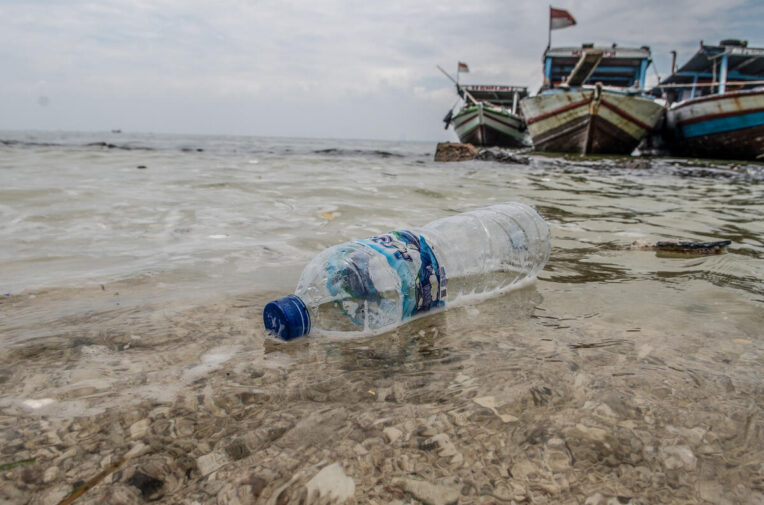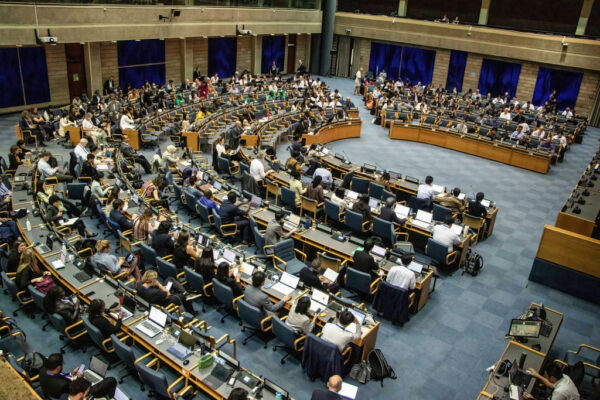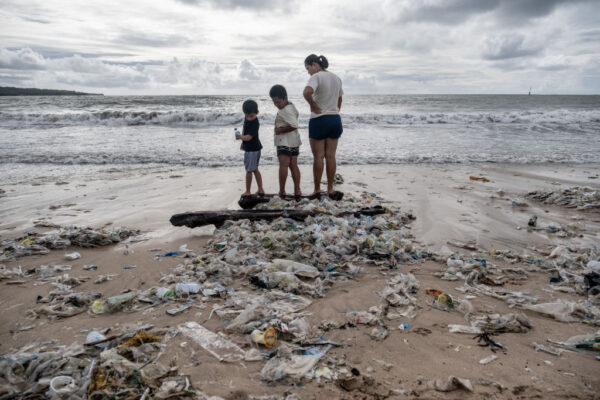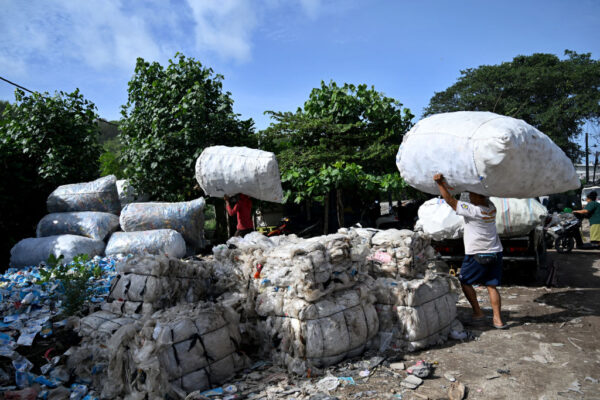
A waste bottle with Danone brand "Aqua" labelling floats on the water during a beach clean up and brand audit in North Jakarta, Indonesia. Photo: Muhammad Adimaja/Greenpeace
Danone’s plastic offsetting project in disarray following community allegations
The project was suspended after complaints that a recycling facility built by a local partner in Indonesia breached housing regulations and impacted the community’s health.
Danone’s plastic offsetting project in disarray following community allegations
The project was suspended after complaints that a recycling facility built by a local partner in Indonesia breached housing regulations and impacted the community’s health.
A waste bottle with Danone brand "Aqua" labelling floats on the water during a beach clean up and brand audit in North Jakarta, Indonesia. Photo: Muhammad Adimaja/Greenpeace
A plastic offsetting project backed by the food and drink giant Danone has been suspended, following allegations that a recycling facility was built illegally close to a Balinese community and without proper consultation, an Unearthed investigation has found.
Danone’s project was set up as an attempt by the French multinational to offset its enormous plastic footprint in Indonesia, and part of its promise to recover more plastic than it uses in the country by 2025.
It is one of the first and biggest offsetting schemes to be registered under the new plastic credit programme developed by Verra, the world’s biggest issuer of carbon credits.
But it has been in disarray since May last year, when Verra suspended accreditation after receiving complaints that it said warranted “further review”. This move came after Verra was sent complaints by residents and NGOs that one of the facilities in the offsetting project – the Samtaku Jimbaran facility in Bali – was built just metres from people’s homes without consulting nearby villagers, and was damaging residents’ health, documents seen by Unearthed show.
Plastic offsetting is a new market, modelled on carbon offsetting, in which companies aim to cut their “plastic footprint” by paying to “remove” plastic from the environment. This means funding schemes, based largely in the Global South, to support recycling, collection by waste pickers, or the burning of plastic as fuel.
Demand for these offsets is expected to grow as companies come under greater pressure to tackle the environmental harm caused by single-use plastics. Earlier this year, the World Bank and Citi issued a $100 million plastic credits bond that will fund Verra-accredited plastic collection and recycling projects in Ghana and Indonesia.
Verra has been making the case for its plastic credits programme to delegates at the UN’s global plastic treaty, which has just entered its fourth round of negotiations this week in Ottawa, Canada. The UN aims to reach a legally binding agreement to end plastic pollution by the end of the year.
But Indonesian campaigners said projects like Danone’s showed that offsetting was just a wasteful attempt by companies to avoid tackling the root causes of plastic pollution.
“Plastic offsetting is money down the drain – at least in the way it is being done now,” said Tiza Mafira, co-founder of the Indonesian campaign group Plastic Diet Movement and a director at the Climate Policy Initiative.
“This project is an example of that. In Indonesia, and around the world, companies are investing in removing plastic from the environment rather than trying to avoid producing it in the first place.”
Plastic waste pollution of waterways is a major problem in Indonesia. Danone – which describes its subsidiary Aqua as Indonesia’s biggest bottled water brand – has been repeatedly identified as the country’s biggest plastic polluter in waste audits by the Break Free From Plastic (BFFP) campaign.
A Danone spokesperson said the company was continuing to work in Indonesia to reduce the use of plastic, improve recycling, and remove waste from the environment.
She told Unearthed in February that the Bali facility was owned by PT Reciki Mantap Jaya, a “subsidiary” of the Indonesian waste management company Reciki Solusi Indonesia, but Danone had provided initial funding for its waste segregation system and community education.
She added that Danone had “set clear expectations around the standards we expect our partners to meet and took immediate action in 2023, investigating the complaints made about the waste processing facility.”
In March, a local newspaper reported that Reciki Solusi Indonesia was “withdrawing from being a shareholder” in Mantap Jaya and the recycling facility was reducing headcount and struggling with broken equipment.
Following this, Danone told Unearthed in a later statement that its own involvement with the Bali facility had now “completed” and the local operating company was in a “transitional period to find a new investor”.
Unearthed has reached out to Reciki Solusi Indonesia for comment but received no response.

Verra told Unearthed that it could not comment on its “quality control” review of Danone’s offsetting project as it is still ongoing.
A spokesperson said: “Verra believes that the Plastic Program consultation and auditing requirements are the best in the market and serve as a model for transparency, action and integrity.”
He added that plastic credits were not a substitute for “upstream” efforts to reduce plastic use, and both were needed. “We recognise that finance is needed to address plastic pollution downstream, while companies make maximal efforts to reduce virgin plastic usage in the first place,” he told Unearthed.
“Even if the world stopped producing plastic today, a large amount of plastic is already in the environment, or making its way there if we don’t step in with collection and recycling efforts.”
‘Substantive comments’
According to Verra, Danone’s project aims to collect around 170,000 tonnes of plastic in Indonesia by 2030, by supporting the set-up and operation of five waste processing facilities across the country, which were all expected to be run by Reciki.
Project documents show that Reciki builds these sites in “public-private partnership” deals with local governments, in which the local authorities provide the land for the facilities.
The second of these facilities – Samtaku Jimbaran – opened in Bali in 2021. In December 2022 Verra registered Danone’s offsetting project on its plastic waste reduction programme.
But in May last year, Verra wrote to Danone saying it was opening a “quality control” review of the offsetting scheme, in response to “substantive comments from stakeholders” about the project. Verra suspended the issuance of plastic credits from the scheme until this review was complete.
Eleven months later, the review is still ongoing, and the status of the project is marked as “on hold” on Verra’s register. The Bali facility continued to operate despite the review, but since the developments in March and Danone’s support coming to end, its future is now unclear.
Danone did not comment on whether it would continue to seek accreditation from Verra for the Bali facility or the wider scheme. “While we have used project certification using the Verra scheme in the past, we have not purchased plastic credits from this project,” said the company spokesperson.
“We believe that further research is needed to test the effectiveness of plastic credits, and we will be guided by the principles set by the UN Global Treaty on Plastics.”
Danone’s spokesperson said plastic credits were just one among several plastic waste solutions the company was working on. “With partners, we support 36 facilities across Indonesia, alongside a network of community waste banks and nearly 10,000 waste collectors throughout Indonesia,” she said. “As a result of these efforts, we are able to collect up to 22,000 tons of plastic waste each year.”

‘Tacit consent’
A Verra spokesperson told Unearthed that it had not received any information from Danone indicating that the Bali facility was not operating properly and was seeking new investors, or that Danone was no longer providing support for it.. He told Unearthed that it was possible for proponents to adapt projects in the plastic program, or withdraw them altogether, but Danone had not sought to do either.
Verra has declined to give any detail about the comments which triggered its review, except to say that it received them between December 2022 and April 2023.
However, Unearthed has obtained documents which show that Verra received a series of complaints about Samtaku Jimbaran during this period, which included the following allegations:
- That the facility was set up in breach of Indonesian regulations which prohibit the siting of a recycling plant within 500m of residential housing. Residents estimate that the nearest home is less than two metres away from the edge of the facility.
- That many residents have experienced health issues, including breathing problems, headaches and upset stomachs, which they believe have been caused by the smell from the facility.
- That many people living close by were not consulted before the facility was built; documentation about the project had not been made available to the local community and was not published in Indonesian.
Satellite imagery analysed by Unearthed indicates there were more than 100 homes within 500m of the site before it was built, with some homes less than 100m away.
Danone stated in its project proposal that Reciki had obtained consent from the community on the basis that the project was endorsed by the local government and the provision of a public service amounts to “tacit consent”. It also obtained a letter of consent from surrounding communities and said the village head was participating in the process.
However, Jero Agung Dirga, the traditional head of the village in which the facility is based, told Unearthed that according to residents’ complaints to him, “the management did carry out outreach”, but this was “with residents who were not affected, who lived further away from the [facility’s] location, not with residents closest to the project who experienced the impacts”. He himself was not involved in any consultation before the facility was built, he added.
The complaints sent to Verra last year were not the first the accreditation company has received about the Bali facility. Unearthed has also analysed documents, filed with Verra before its registration of the project, in which Danone and Reciki respond to complaints received in 2022. The companies admit that contaminated waste liquid leaked into local waterways and burning of fabric waste took place on site, which could have led to black smoke. In response, Reciki committed to upgrading its wastewater management system and to increase the capacity of its equipment to capture smoke.
Other documents seen by Unearthed show that over the last two years people have complained about the smell from as far as a kilometre away. Residents have complained of vertigo and sleeping problems, and that they have had to attend hospital due to health problems they attribute to the fumes.
“The smell was absolutely appalling,” Owen Podger, a former resident who lived about 150m from the facility until he moved away last year, told Unearthed: “For two months, we had to close our windows and doors almost all the time, then for months after, several hours each day. We couldn’t sit outside our house or do our shopping in the morning. My wife had cancer and this made the last months of her life very hard.”
Dirga told Unearthed that other residents wish to leave the area too. “[They] want to sell their property, but they don’t move because no one wants to buy it, he said. “The main problems they complain about are the odour, that the location around [the facility] is not clean, and that they are very worried about their health.”
According to Danone’s project documents, the facility receives local municipal waste. It sorts and bales around 40% of the plastic in that waste to be sold on for recycling; the remaining, lower-quality plastics are converted on-site into Refuse Derived Fuel (RDF), a process that turns waste into fuel pellets through shredding, heat or compression.
Last year Verra’s contracted auditor found that the RDF, made at the Balinese facility did not meet legal standards for sale. Verra has not yet certified or approved the facility’s production of RDF under its plastic programme.

‘Greenwashing its image’
Documents show that Danone originally envisaged issuing plastic credits from its Indonesian offsetting project, saying it would be “beneficial for the project’s long-term sustainability”. However, it later later changed its plan to state that credits would not be issued and said that it intended to use Verra’s scheme as independent certification of the amount of plastic it is recovering in Indonesia.
“This is still enabling Danone to greenwash its image,” Emma Priestland, campaigns coordinator at global NGO Break Free From Plastic (BFFP), told Unearthed. “The claim that they are tackling plastic pollution by collecting more packaging than they sell is a distraction designed to avoid making real, substantive changes to their business model, so they can continue polluting Indonesia with single use plastics.”
Danone is one of the world’s biggest food and drink companies. It is currently facing a legal challenge from environmental groups who allege it has failed to adequately address its plastic footprint, using a landmark French law that requires companies to prevent human rights violations and environmental damage in their chain of activity. No ruling has yet been made.
Plastic offsetting is a burgeoning new market that has emerged in the last few years and which has received significant support from major plastic polluters. Unilever and Nestlé subsidiaries have made claims of “plastic neutrality” respectively in India and Philippines, where Plastic Credit Exchange – the biggest player in the market – has sold most of its credits.
Danone sits on the advisory board for Verra’s plastic credit programme and was part of the 3R initiative, one of the initial efforts that developed the concept of plastic credits. A Verra spokesperson told Unearthed that “engagement in these groups has no bearing on a project’s eligibility or the processes that Verra follows for reviewing a project.”
A Verra spokesperson also denied that their efforts at plastic treaty negotiations amounted to lobbying and told Unearthed: “Verra is an accredited UN observer and participates in the treaty process to educate stakeholders on the role of Verra’s Plastic Program as a framework to mobilise finance for plastic waste collection and recycling activities.”
On Tuesday this week, Verra hosted a side event at the treaty negotiating round in Ottawa to discuss the World Bank and Citi’s $100 million plastic credits bond. Speaking at this event, Fei Wang, senior financial officer for market solutions at the World Bank said: “We hope that this becomes a market and we hope other issuers can issue as well.”
When asked by Unearthed about the issues raised by the Danone project, he said: “There are always projects that are not working….it is a challenge what you have mentioned and seen in other projects, but that’s why we want to work with partners who have a track record.”
The Bank looked independently into the two projects that the bond is supporting and will make reports available to investors on an annual basis, he added.




